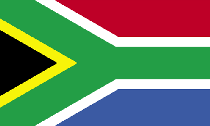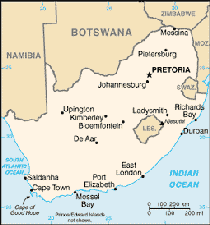Our New Home
Four weeks ago, we bade farewell to our home with the Nchabeleng's.
While we loved the family and the neighborhood we were living in, we found it too difficult to acclimate to cooking, sleeping, and living in a single room. Though our basic needs were exceptionally addressed, we have realized the necessity of having a place where we can feel at home and comfortable with some privacy.
We now live on the other end of town in a more rural area. We no longer enjoy the comforts of a bathtub and flush toilet, or a washing machine. We pump our water by hand, are again taking bucket baths and hand washing clothing. We are loving it. While the Peace Corps has always told us "don't have any expectations," these were things we expected to experience while living in South Africa.
The small house we now live in is about 100 sq ft more than the room we were in before, but there are two rooms and a thatch roof. The kitchen windows look out over the family corn field and each night we can watch the sun set on the village.
One of my principals was a great help in assisting us to find new housing. She and Jennie walked through this part of the village while I was away at an in-service training (IST) in Zeerust. They found a few houses, but they were similar to our situation at the time - one smaller room close to the main house. My principal asked a woman at work on her mealie crop if she knew of any accommodations available in the area. She pointed across the landscape, saying "the retired policeman on the hill, he has rooms available." The old man didn't hesitate when asked, he understood our purpose in the village and immediately showed Jennie and Ms. Thamaga the two rooms.
When I returned from IST, I went to introduce myself and see the rooms. My principal also suggested I sweep it out so it looked nice when my supervisor from Peace Corps came to check it out. When I arrived, they had already swept it out, someone was hanging curtains, and they had called an electrician to fix the lights and outlets. Our supervisor approved our move the following week.
Our family has been very welcoming but also allowed us a great deal of privacy. The grandfather is a retired police officer and the grandmother is originally from Botswana. She speaks a little English,but most of our conversations are in the native language which we sometimes understand and other times eventually figure out. To complicate our communication, she speaks seTswana, the language of Botswana and North West Province in South Africa. It is very similar to Sepedi, spoken here in Limpopo, but as we are still learning the language, to hear the seTwana adds a twist.
Grandfather's grandfather was the khoši (chief) who founded our village, and his father founded a nearby "suburb" of the village. He gets a kick out of the fact that two of his biological grandchildren have the names Monare and Bontle, the same African names we were given.


